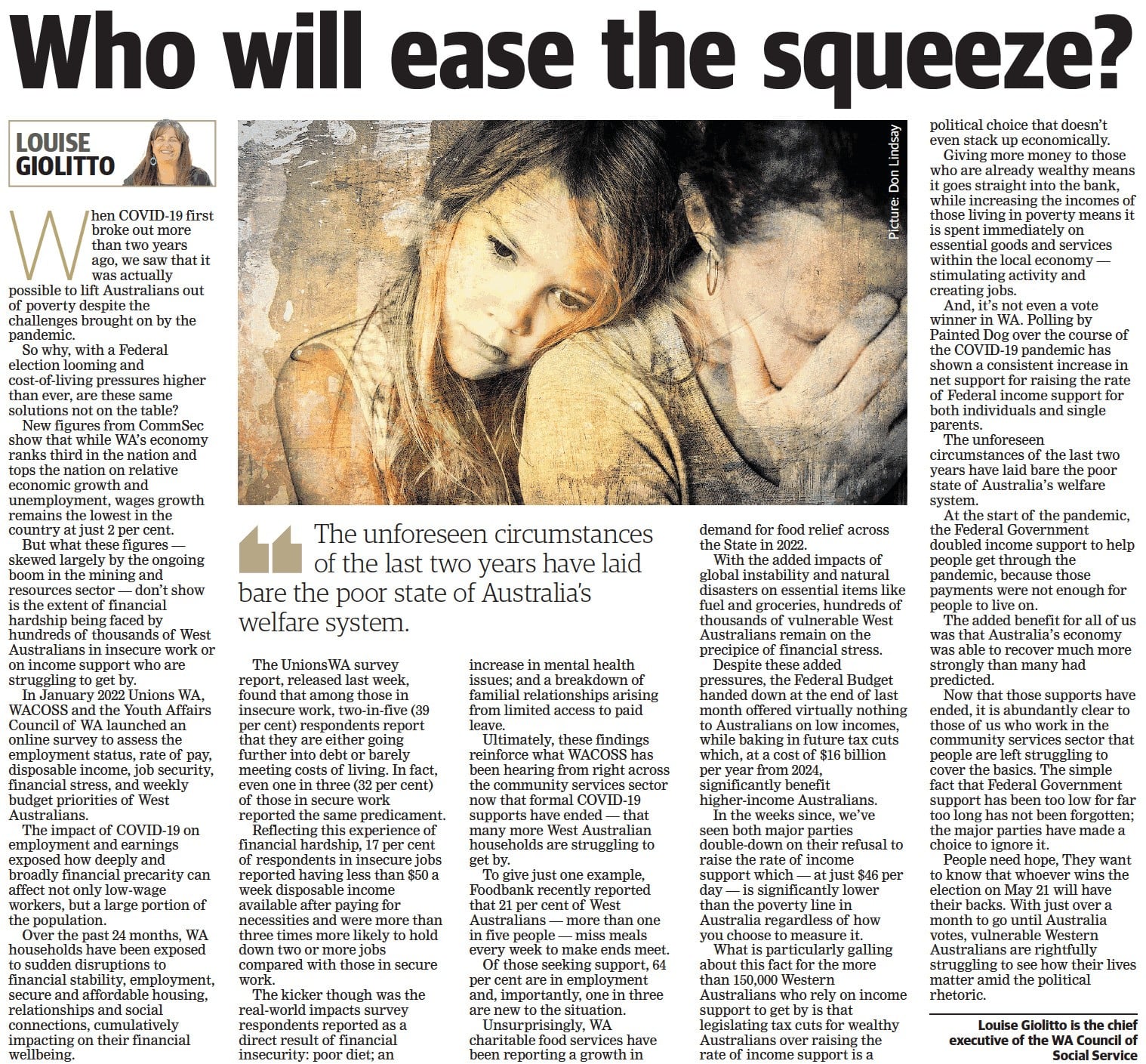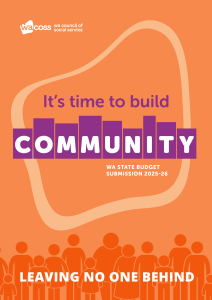When COVID-19 first broke out more than two years ago, we saw that it was actually possible to lift Australians out of poverty despite the challenges brought on by the pandemic. So why, with a Federal Election looming and cost of living pressures higher than ever, are these same solutions not on the table?
New figures from CommSec show that while WA’s economy ranks third in the nation and tops the nation on relative economic growth and unemployment, wages growth remains the lowest in the country at just two per cent.
But what these figures – skewed largely by the ongoing boom in the mining and resources sector – don’t show is the extent of financial hardship being faced by hundreds of thousands of Western Australians in insecure work or on income support who are struggling to get by.
In January 2022 Unions WA, WACOSS and the Youth Affairs Council of WA launched an online survey to assess the employment status, rate of pay, disposable income, job security, financial stress, and weekly budget priorities of Western Australians
The impact of COVID-19 on employment and earnings exposed how deeply and broadly financial precarity can affect not only low-wage workers, but a large portion of the population. Over the last 24 months, Western Australian households have been exposed to sudden disruptions to financial stability, employment, secure and affordable housing, relationships and social connections, cumulatively impacting upon their financial wellbeing.
The Unions WA survey report, released this week, found that among those in insecure work, two in five (39%) respondents report that they are either going further into debt or barely meeting costs of living. In fact, even one in three (32%) of those in secure work reported the same predicament.
Reflecting this experience of financial hardship, 17 per cent of respondents in insecure jobs reported having less than $50 a week disposable income available after paying for necessities and were more than three times more likely to hold down two or more jobs compared with those in secure work.
The kicker though, was the real-world impacts that survey respondents reported as a direct result of financial insecurity: poor diet, an increase in mental health issues and a breakdown of familial relationships arising from limited access to paid leave.
Ultimately, these findings reinforce what WACOSS has been hearing from right across the community services sector now that formal COVID-19 supports have ended – that many more Western Australian households are struggling to get by.
To give just one example; Foodbank recently reported that 21 per cent of Western Australians – more than one in five people – miss meals every week to make ends meet. Of those seeking support, 64 per cent are in employment and, importantly, one in three are new to the situation.
Unsurprisingly, Western Australian charitable food services have been reporting a growth in demand for food relief across the state in 2022.
With the added impacts of global instability and natural disasters on essential items like fuel and groceries, hundreds of thousands of vulnerable Western Australians remain on the precipice of financial stress.
Despite these added pressures, the Federal Budget handed down at the end of last month offered virtually nothing to Australians on low-incomes, while baking in future tax cuts which, at a cost of $16 billion per year from 2024, significantly benefit higher-income Australians.
In the weeks since, we’ve seen both major parties double-down on their refusal to raise the rate of income support which – at just $46 per day – is significantly lower than the poverty line in Australia regardless of how you choose to measure it.
What is particularly galling about this fact for the more than 150,000 Western Australians who rely on income support to get by is that legislating tax cuts for wealthy Australians over raising the rate of income support is a political choice that doesn’t even stack up economically.
Giving more money to those who are already wealthy means it goes straight into the bank, while increasing the incomes of those living in poverty means it is spent immediately on essential goods and services within the local economy – stimulating activity and creating jobs.
And, it’s not even a vote winner in WA. Polling by Painted Dog over the course of the COVID-19 pandemic has shown a consistent increase in net support for raising the rate of federal income support for both individuals and single parents.
The unforeseen circumstances of the last two years have laid bare the poor state of Australia’s welfare system.
At the start of the pandemic, the federal government doubled income support to help people get through the pandemic, because those payments were not enough for people to live on. The added benefit for all of us was that Australia’s economy was able to recover much more strongly than many had predicted.
Now that those supports have ended, it is abundantly clear to those of us who work in the community services sector that people are left struggling to cover the basics. The simple fact that Federal Government support has been too low for far too long has not been forgotten; the major parties have made a choice to ignore it.
People need hope; they want to know that whoever wins the election on May 21 will have their backs. With just over a month to go until Australia votes, vulnerable Western Australians are rightfully struggling to see how their lives matter amid the political rhetoric.
- Louise Giolitto, CEO Western Australian Council of Social Service
This article was published in the West Australian on Monday 2 May 2022. You can find it on our Facebook here or over on the West Australian website in the opinion section.




